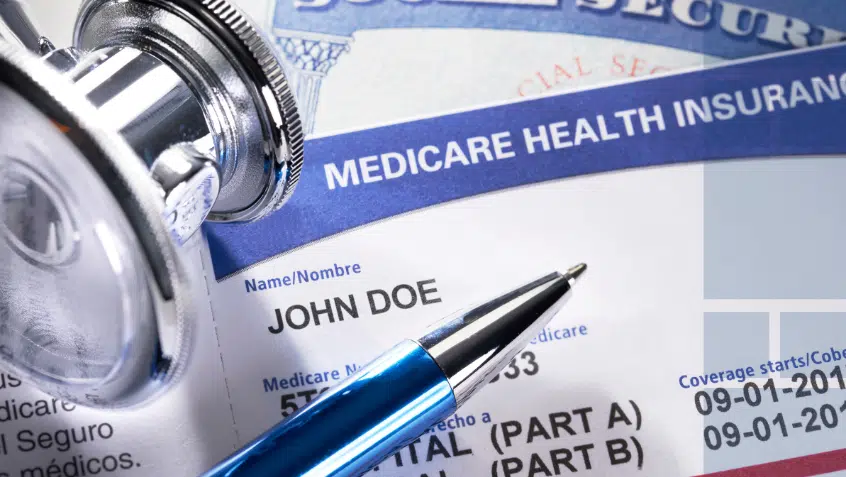Take Action: Tell your senators to reject harmful cuts to health care!
What You Need to Know About Coronavirus and Medicare Coverage

We will provide updates and information on this page as available. If you have questions about your Medicare coverage and the coronavirus national emergency, please review the resources below and call our national helpline at 800-333-4114.
12/11/2020 Update: A COVID-19 vaccine has been authorized for limited emergency use. Relevant changes have been made below.
As the number of cases of COVID-19 (also called coronavirus) increases, so does the importance of programs like Medicare in helping older adults, people with disabilities, and their families build and maintain their health and economic security. Accordingly, policymakers are taking critical steps to ensure program preparedness, keep beneficiaries and the public informed, and facilitate timely access to appropriate care.
The Centers for Medicare & Medicaid Services (CMS) is working to address the spread of the disease and inform people with Medicare about the services that Medicare covers. The Centers for Disease Control and Prevention (CDC) has identified older adults and people with serious chronic medical conditions like heart disease, diabetes, and lung disease as being at higher risk from the virus.
In general, Medicare covers medically necessary items and services that a beneficiary receives from a provider who accepts Original Medicare or is in-network for the beneficiary’s Medicare Advantage Plan. Medicare Advantage Plans must cover everything that Original Medicare does, but they can do so with different costs and restrictions.
Medicare-covered services related to coronavirus include
Coronavirus testing will be covered under Medicare Part B as a clinical laboratory test. A beneficiary’s doctor can bill Medicare for this test beginning April 1, 2020 for testing provided after February 4, 2020. A beneficiary will owe nothing for the laboratory test and associated provider visits (no deductible, coinsurance, or copayment). This applies to both Original Medicare and Medicare Advantage Plans.
A COVID-19 vaccine has been authorized for limited emergency use. This emergency authorization means that the vaccine is only available for certain groups of people, such as nursing home residents and health care workers. The vaccine is not yet approved for or available to everyone. Beneficiaries should speak with their doctor to learn more about their eligibility to receive the vaccine and its availability in their state.
Original Medicare Part B covers the vaccine, regardless of whether someone has Original Medicare or a Medicare Advantage Plan. They will owe no cost-sharing (deductibles, copayments, or coinsurance).
If a beneficiary wants to refill their prescriptions early so that they have extra medication on hand, they should contact their Part D drug plan to learn what is covered. Their plan may require extra approval before it covers early refills, and not all prescriptions can be refilled in advance.
During the emergency, all Medicare Advantage and Part D plans must cover up to a 90-day supply of a drug when a beneficiary asks for it. Plans cannot use quantity limits on drugs that would prevent a beneficiary from getting a 90-day supply, if they have a prescription for that amount. However, some safety limits are still in place to prevent unsafe doses of opioids.
Note: If a beneficiary takes medications that are covered by Part B, they should ask their doctor and plan for more information about ensuring they have an adequate supply.
Inpatient hospital care is covered under Medicare Part A, and standard coverage rules and cost-sharing apply. Medicare typically covers a semi-private room, but it should cover a private room when it is medically necessary. For example, if a beneficiary needs a private room in order to be quarantined, you should not be asked to pay an additional cost for the private room. If a beneficiary has a Medicare Advantage Plan, they should contact their plan to learn about its costs and coverage rules.
Outpatient hospital care is covered under Part B, and standard coverage rules and cost-sharing apply. If a beneficiary receives observation services at a hospital, they are considered an outpatient—even if they have a room or stay overnight. Whether a beneficiary is an inpatient or outpatient is important because, depending on their situation, a beneficiary may be required to have an inpatient stay before Medicare will cover skilled nursing facility (SNF) care.
Medicare Part A generally only covers SNF care if someone was a hospital inpatient for three days in a row before entering the SNF. This is known as the three-day qualifying hospital stay.
At this time, Medicare has removed the three-day qualifying hospital stay requirement for beneficiaries who experience dislocations or are otherwise affected by the coronavirus public health emergency. According to Medicare, this waiver includes but is not limited to beneficiaries who:
- Need to be transferred to a SNF, for example, due to nursing home evacuations or to make room at local hospitals
- Need SNF care as a result of the current public health emergency, regardless of whether they were previously in the hospital
Medicare is also changing other SNF coverage requirements. Typically, Medicare Part A covers up to 100 days of SNF care each benefit period. A benefit period begins when a beneficiary is admitted to a hospital as an inpatient, or to a SNF, and it ends when they have been out of a SNF or hospital for at least 60 days in a row. The 100 days of covered SNF care reset at the beginning of a new benefit period. Beneficiaries who cannot start a new benefit period because of the public health emergency can get another 100 days of covered SNF care without having to begin a new benefit period.
Also note that Medicare is working with SNFs to help limit the spread of COVID-19.
Part B covers services a beneficiary receives from a physician (or other provider, such as a registered nurse) who visits their home. Part B also covers some services that are not provided face-to-face with a doctor, such as check-in phone calls and assessments using an online patient portal. Virtual check-ins can be used to assess whether a beneficiary should go to their doctor’s office for an in-person visit.
A telehealth service is a full visit with a provider using telephone or video technology that allows for both audio and video communication. Medicare generally only covers telehealth in limited situations for certain beneficiaries, but it has expanded coverage and access during the public health emergency. Starting March 6, 2020, Medicare covers hospital and doctors’ office visits, behavioral health counseling, preventive health screenings, and other visits via telehealth for all beneficiaries and in settings that include the beneficiary’s home. Telehealth services can also be used for the face-to-face visits required for Medicare coverage of home health care and hospice care.
Health care providers who can currently offer these telehealth services include doctors, nurse practitioners, clinical psychologists, licensed clinical social workers, physical therapists, occupational therapists, and speech language pathologists. Standard cost-sharing may apply, but note that a provider can choose not to charge the beneficiary for cost-sharing for these services. If a beneficiary has a Medicare Advantage Plan, they should contact their plan to learn about its costs and coverage rules.
Limited telehealth services can now be delivered using only audio. These services include counseling and therapy provided by an opioid treatment program, behavioral health care services, and patient evaluation and management. If a beneficiary has questions about technology requirements for telehealth services, they should ask their provider.
Medicare covers home health care for beneficiaries who are homebound, need skilled nursing or therapy care, and are prescribed home health care after a face-to-face visit with their doctor. During the public health emergency, some of these coverage requirements have been changed.
First, the homebound requirement can be met in additional ways. Someone will can be considered homebound if their physician certifies that they cannot leave their home because they are at risk of medical complications if they go outside, or if they have a suspected or confirmed case of COVID-19. If the beneficiary also needs skilled care at home, they could qualify for the home health care benefit.
Second, a doctor usually has to prescribe home health care, but during the public health emergency other providers, including nurse practitioners and physician assistants, can prescribe the care, too. The face-to-face visit requirement can be met through telehealth.
Third, home health care agencies can provide more services via telehealth, as long as the services are listed on the beneficiary’s plan of care. The telehealth services may not be used in place of in-person services listed on the plan of care.
Note: If a beneficiary has Medicare and Medicaid, Medicaid may cover additional services as long as the beneficiary sees providers who accept Medicaid. Contact the local Medicaid office for more information.
Accessing services during public health emergency
During emergencies, Medicare Advantage Plans must work to maintain access to health care services and prescription drugs for plan members living in affected areas. Plans must meet certain requirements following the declaration of a disaster, emergency, or public health emergency. Medicare Advantage Plans must:- Allow beneficiaries to receive health care services at out-of-network doctor’s offices, hospitals, and other facilities Charge in-network cost-sharing amounts for services received out-of-network
- Waive referral requirements
- Suspend rules requiring the beneficiary tell the plan before getting certain kinds of care or prescription drugs, if failing to contact the plan ahead of time could raise costs or limit access to care
- Cover formulary Part D drugs filled at out-of-network pharmacies
- Part D plans must do this when beneficiary cannot be expected to get covered Part D drugs at an in-network pharmacy
- Cover up to 90-day supply (or length of the prescription, whichever is shorter) of prescription at beneficiary’s request
- Plans cannot impose quantity limits on a drug that would prevent a beneficiary from getting full 90-day supply, as long as they have prescription for that amount
- Some safety checks are still in place to prevent unsafe doses of opioids
-
Make other needed changes to ensure beneficiaries can access their medication without interruption
-
Plans have different options for how to do this, such as lifting restrictions that prevent a beneficiary from filling a prescription too soon
-
- Removing prior authorization requirements for certain services
- Relaxing restrictions on home or mail delivery of prescription drugs
- Relaxing restrictions on refilling prescriptions too soon
- Making mid-year changes that would provide more generous coverage (lower cost-sharing) or adding additional benefits
- Not disenrolling beneficiaries who:
- Fail to pay premiums
- Live outside of plan service area for more than six months
- No longer qualify for specialized type of plan known as Special Needs Plan (SNP)
For more information or help accessing Medicare benefits:
- 1-800-MEDICARE
- Medicare Rights Center National Helpline: 800-333-4114
- Medicare Interactive
- State Health Insurance Assistance Program (SHIP)
- Senior Medicare Patrol (SMP)
- The CDC’s coronavirus website
For more information about preventive measures and keeping safe:
Show Comments
We welcome thoughtful, respectful discussion on our website. To maintain a safe and constructive environment, comments that include profanity or violent, threatening language will be hidden. We may ban commentors who repeatedly cross these guidelines.
Help Us Protect & Strengthen Medicare.
Donate today and make a lasting impact.
The Latest
Most Read
Add Medicare to Your Inbox
Sign up to receive Medicare news, policy developments, and other useful updates from the Medicare Rights.
View this profile on InstagramMedicare Rights Center (@medicarerights) • Instagram photos and videos









